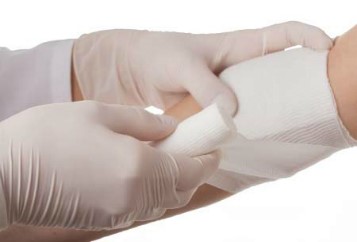INFECTIONS FROM SURGERY, THE RISKS YOU SHOULD KNOW
Estimated Reading Time: 7.8minutes

WHAT IS A SURGICAL SITE INFECTION
A surgical site infection happens when pathogens multiply at the site of a surgical incision, causing an infection. Other infections can result from surgery as well including urinary tract infections and respiratory infections. Surgical site infections are not uncommon and occur in two to five percent of surgeries that involve incision to the skin rather than procedures involving scopes. The rate of infection is different depending on the type of surgery being performed. It is estimated that as many as 500,000 surgical site infections occur in the United States yearly. Most surgical site infections are staph infections. https://www.cdc.gov/hai/ssi/ssi.html In fact:
“Approximately 27 million surgical procedures are performed in the United States each year, with up to 5% resulting in surgical site infections. Trends in the incidence of SSI are monitored by the National Nosocomial Infections Surveillance (NNIS) system of the Centers for Disease Control and Prevention (CDC). According to NNIS data, SSIs are the third most frequently reported nosocomial infection and are associated with substantial morbidity that can endanger a patient’s life, increase the number of days in the hospital, and increase healthcare costs.” https://www.infectiousdiseaseadvisor.com/home/decision-support-in-medicine/hospital-infection-control/surgical-site-infections/
Three types of surgical site infections are the most common. They’re categorized according to the severity of the infection. Infections are caused by germs that enter your body during or after surgery. In severe cases, surgical site infections can cause conditions such as sepsis and can even cause an infection in your blood that can result in organ failure.
IT IS IMPORTANT TO RECOGNIZE INFECTION QUICKLY
A surgical site infection is classified as a condition that begins at the site of a surgical wound less than 30 days after the incision is made. Symptoms of a surgical site infection after surgery include:
- redness and swelling at the incision site
- drainage of yellow or cloudy pus from the incision site
- fever
Recognizing a Skin infection after surgery
A surgical site infection that affects the layers of your skin at the incision site is called a superficial infection. If you see any signs of infection at the site of your incision it is critical to obtain competent emergency care immediately.
Bacteria from the surgical facility, a surgeon’s hands, and equipment at the surgical center can be transmitted into your wound at the time of your surgical procedure. Since your immune system is focused on recovering from surgery, the germs then multiply at the site of your infection. These types of infections can cause pain but usually can be cured with antibiotics. In severe cases, your doctor may need to open your incision and drain the infection.
Muscle and tissue wound infection after surgery
A muscle and tissue wound infection after surgery, also called a deep incisional SSI, involves the soft tissues surrounding your incision. This kind of infection goes deeper than your skin layers and can result from an untreated superficial infection.
These can also be the result of medical devices implanted in your skin. Deep infections require treatment with antibiotics. Your doctor may also have to open your incision completely and drain it to get rid of infected fluid.
Organ and bone infection after surgery
An organ and bone infection after a surgery involves any organ that’s been touched or manipulated as a result of a surgical procedure.
These kinds of infections can develop after an untreated superficial infection or as the result of bacteria being introduced deep in your body during a surgical procedure. These infections require antibiotics, drainage, and sometimes a second surgery to repair an organ or address the infection.
Know your risk factors
Infections occur more commonly in older adults and those with certain health conditions. Diabetes, obesity, smoking, and a history of skin infections are risk factors that may cause you to be more likely to suffer infection following a surgery. However, everyone is at risk of a surgical site infection from unsafe facilities and that is why it is important to monitor your own symptoms following a procedure.
When to seek medical care
If you have any symptoms of a surgical site infection following a procedure, you should contact your doctor immediately. Such symptoms include:
- Pain, and irritation at the surgical site
- Fever that spikes at 100.3°F (38°C) or higher for more than 24 hours
- Any type of drainage from the site that is yellow, tinged with blood, cloudy, or odorous.
Prevention
The Centers for Disease Control and Prevention provides continuously updated recommendations for medical providers to help prevent site infections. There are also steps you can take before and after surgery to reduce the risk of infection.
Things to Do Prior to surgery:
- Wash with an antiseptic cleanser from your doctor before you head to the hospital.
- Don’t shave, as shaving irritates your skin and can introduce infection under your skin.
- Quit smoking before you have surgery, as smokers develop infections. Quitting can be very difficult, but it’s possible. Speak to a doctor, who can help you develop a quit smoking plan that’s right for you.
Things to do following surgery:
- Be sure to keep the sterile dressing that your surgeon applies to your wound for at least 48 hours.
- Take preventive antibiotics that are prescribed. If they are not prescribed ask your doctor about them.
- Pay special attention to the instructions on how to take care of your incision site,
- Always wash your hands with soap and water before changing the dressing,
- If you are in a hospital, be hands-on in the hospital about your care, noting how often your dressing is being changed , making sure your room is sterilized and clean, and that medical staff are washing their hands and wearing gloves when handling your incision.
Unfortunately, surgical site infections aren’t uncommon and knowing your risk before surgery is the best way to prevent infection. Your doctor should follow-up to check your incision for signs of infection after surgeries and should have procedures in place to advise patients what to look for and have after hours medical care accommodations.
If you have any signs of a surgical site infection call the doctor right away. The biggest complications from surgical site infections result from waiting too long to get treatment.
SEVERE CASES OF INFECTION
In some rare but life threatening and severe cases, you can contract an infection known as Necrotizing fasciitis (NECK-re-tie-zing FASH-e-i-tis) which is a rare bacterial infection that spreads quickly in the body and can cause death. That is why it is critical to get immediate medical attention at the first sign of infection. To survive this type of infection, also known as flesh eating bacteria, accurate diagnosis, rapid antibiotic treatment, and prompt surgery are important to stopping this infection. Seek medical care right away if your skin becomes red, warm, swollen, or very painful soon after an injury or surgery. A later blog will focus further on this rare but deadly complication.
CALL US TO DISCUSS YOUR CLAIM
If you or a loved one had a serious infection after a surgical procedure, call our office today. Our personal injury lawyers at TheOneLawyer.com are ready to listen to your situation and help you determine the right course of action to take. Your consultation is free and you do not pay any legal fees until after we settle your case. Contacting an attorney quickly after an injury is critical to your success in being able to recover money damages against the at fault party.
If you have a question regarding any type of personal injury, please don’t hesitate to call the offices of TheOneLawyer.com and speak directly to attorney Laura Marie Payne-Hunt, Esq. a Henderson Injury Attorney for over 15 years. Laura is recognized as one of Nevada’s Top 100 Lawyers. She has the experience and knowledge to obtain the maximum settlement you deserve. Please call our office if you or if a loved one is injured. We can make sure that you receive the care you need and deserve and advise on how to preserve evidence.
At our office, we are experienced in helping injured victims get the compensation they are entitled to. Insurance companies never have the best interest of the injured person at the top of their priorities. They want to pay as little on every claim as possible. Having worked for an insurance company as an attorney for 9 years before opening my boutique law firm specializing in helping injured people, I reviewed thousands of auto accident claims and policy provisions.
At the Henderson and Las Vegas Accident injury law offices of TheOneLaweyer.com, Laura Marie Payne-Hunt and her staff are here to help you and your family in the event that accidents and tragedies occur. For any of your legal needs, do not hesitate to contact our Henderson and Las Vegas Accident injury offices. TheOneLawyer.com is a boutique, family owned law firm that specializes in helping injured people and the community of Las Vegas and Henderson Nevada with legal issues involving auto accidents, wrongful deaths, slip and falls, truck accidents, injuries to children, bicycle accidents, dog bites, product liability claims, and all types of injury claims. Please do not hesitate to call us anytime you have a legal question or you or a loved one has sustained an injury at 702-450-(HUNT) 4868 and text 24/7 at 702-600-0032.










